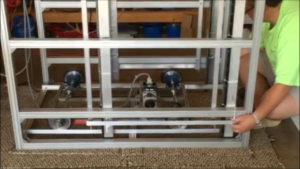You mentioned that sketching was how you captured your ideas for Alert Innovation and conveyed those ideas to your co-founder. Can you elaborate more on this collaboration process when you were both building Alert Innovation?
Bill Fosnight: John Lert had done a nice job sketching system level ideas he conceived using two-dimensional tools like Vizio. As we got into more detail on how our mobile robots would operate and interact within a three-dimensional space it was much easier for us to view and discuss three-dimensional models. After one of my first discussions with John in 2012, I took the initiative to learn Google SketchUp over a weekend. While previously trained in expensive CAD tools, I was amazed with what I could quickly sketch using the free version I downloaded. Not only could we more quickly analyze system level concepts, I found it good enough to design and build our garage prototypes with, and even lay out the actual Alphabot mechanical design. One of my favorite stories is when John decided we should have an “animation” of how our bot transforms itself into an elevator in our PowerPoint presentation for Walmart CEO, Doug McMillon. This decision came less than 30 minutes before Doug’s arrival. Fortunately, I was able to get it done! –Scroll down to see picture of prototype–
Is there anything on the horizon that excites you most about automation innovation possibilities or retail disruption in a way we have not yet seen as consumers?
Bill Fosnight: I’m very excited about how automation is a key enabler to digitizing our store operations. With comprehensive and accurate data, we will be able to serve customers with increasingly better quality, speed and cost. Inventory accuracy ensures customers always get the products they want with high quality (often freshness in grocery). Automation allows us to fulfill even large customer orders within a few minutes and serve more customers. It’s cool thinking even today people can decide to order on-line and save 45 minutes of their time every week. Perhaps most importantly, the combination of automation and data allows us to optimize the operations of our supply chain and stores that results in lower cost for our customers. It’s exciting to be able to continue and accelerate Sam Walton’s pursuit of Every Day Low Prices that improve the lives of millions.
Walmart was your earliest customer. How did that customer relationship begin and what was the clincher for Walmart in deciding to acquire Alert Innovation versus using your solutions as a customer?
Bill Fosnight: I often talk about how important networking is; here’s a story that made it very real for me. John Lert had networked with a Harvard professor and shared our vision of putting robots in grocery stores to improve the lives of shoppers while at the same time improving the operating efficiency of the stores. A big part of this was solving the “last mile” cost of getting groceries to customers. At the time, building large, automated grocery fulfillment centers was the common thought to be able to afford the automation but it created the challenge and expense of delivering as far as 40-50 miles to customers. Our approach was developing automation cost and space efficient enough to work in grocery stores, not to mention reliable enough to directly serve customers and work in ambient, chilled and frozen environments. Anyway, the Harvard professor had the chance to network with Doug McMillon at the Economic Forum in Davos, Switzerland in February 2016. Walmart also had the vision and recognized the benefits of automating fulfillment at store level; they were “scouring the earth” for a solution that met all the challenging requirements mentioned above. Fortunately, we were introduced to Doug and were able to start-up Alert Innovation just 6 months later in August 2016. I can’t say how proud I am of the team we built and how we were able to execute on developing the full Alphabot system on an extremely aggressive 24-month timeline. Our team continued to show our ability to innovate, develop and deploy solutions over the following years. While Walmart recognized our technology uniquely served their needs, I believe they ultimately acquired us in November 2022 for what our team is continuing to do to better serve Walmart’s customers.
Finally, what advice would you offer to other engineers and non-engineers who are launching startups in the manufacturing space?
Bill Fosnight: I’d say first take every opportunity presented to learn the space you are interested in. Be curious and reach out to people who are willing and often excited to share their experience and knowledge with you; build your network. When given a challenge, jump on solving it that night and show what you’re capable of; build your reputation. One of my first and favorite professional mentors, Tony Bonora of Asyst Technologies once told me, “There are endless opportunities, the trick is figuring out which one to pursue”. When I met John Lert, I was first a little skeptical about putting robots in grocery stores; it seemed crazy just 10 years ago. I spent a lot of time thinking about the viability of John’s idea. I did a lot of diligence studying retail and grocery stores (remember I was in the “high-tech” semiconductor industry). I also studied competitive automation companies to ensure we would have a differentiated solution. When I realized all of this checked out and just how big the opportunity was to change an industry even bigger than semiconductor while also improving the lives of millions, I jumped on it and have never looked back!
Picture of garage prototype for Alphabot using SketchUp
